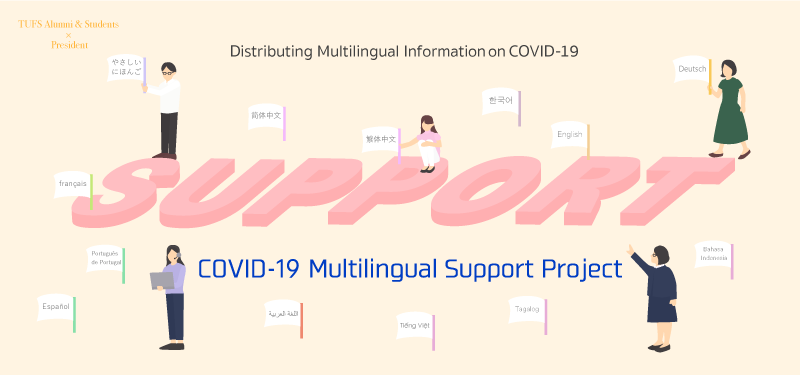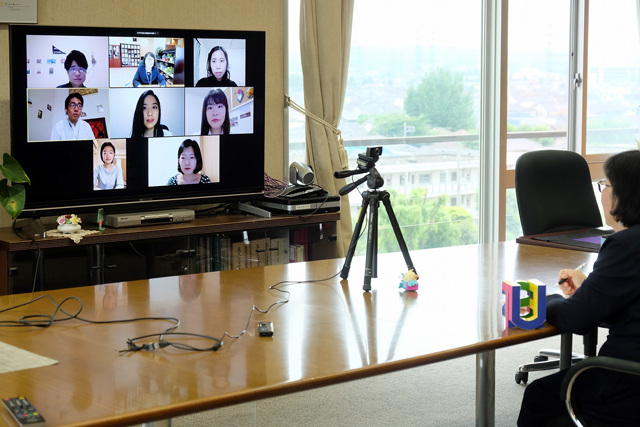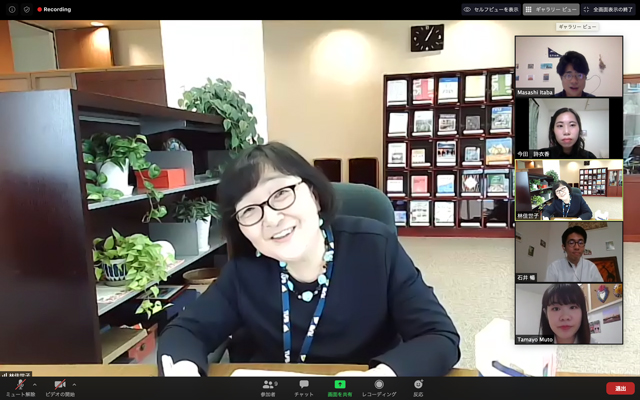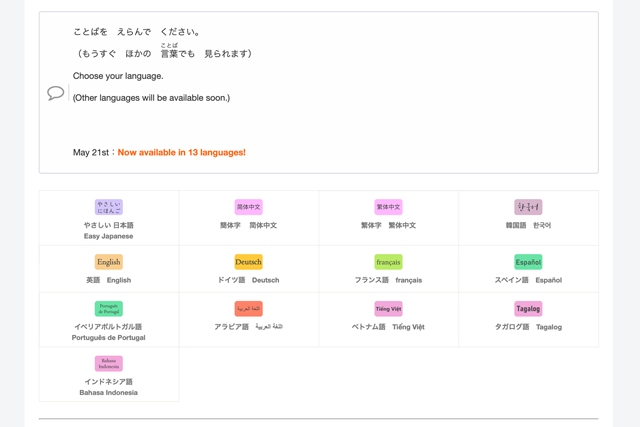TUFS Alumni & Students x President Distributing Multilingual Information on COVID-19: COVID-19 Multilingual Support Project
世界にはばたく卒業生

The “COVID-19 Multilingual Support Project”, a joint effort between current students and alumni of TUFS, began to distribute information on the COVID-19 coronavirus in multiple languages from April 21, 2020. At first, this project focused on distributing information in simple Japanese and English, but as of May 18, the date this interview took place, this had expanded to 10 languages including Korean, Chinese, simplified Chinese, Spanish, French, Vietnamese, Arabic and Iberian Portuguese. As of June 1, this project now caters to 13 languages, with the newest additions being German, Tagalog and Indonesian. TUFS President HAYASHI Kayoko held an online interview with the seven core members of this project.
・President HAYASHI Kayoko (“Hayashi”)
・ISHII Toru (“Ishii”): Project Leader. Graduated from the School of International and Area Studies (French major) in March 2020, and plans to enter MSc Africa and International Development at the University of Edinburgh from September 2020.
・YAMAGUCHI Moe (“Yamaguchi”): Editor-in-chief of foreign language articles. Graduated from the School of International and Area Studies (French major) in March 2020, and plans to move on to higher education at the University of Surrey in September.
・IMADA Shiika (“Imada”): Editor-in-chief of Japanese articles. Graduated from the School of Language and Culture Studies (Korean major) in March 2018, completed her Master’s degree (Japan Studies) at TUFS in March 2020, and began working for the Japan Foundation the following April.
・MUTO Tamayo (“Muto”): Editor-in-chief of Japanese articles. Currently studying in the School of Language and Culture Studies (English major).
・ITABA Masashi (“Itaba”): Public relations coordinator. Graduated from the School of Language and Culture Studies (French major) in March 2019, and is currently in his second year of Master’s studies at the University of Tokyo’s Graduate School of Humanities and Sociology.
・IMASEKI Yurika (“Imaseki”): Head of staff. Graduated the School of Language and Culture Studies (Spanish major) in March 2020, and plans to enter the MFA program in curating at Goldsmiths, the University of London from September 2020.
・KAWANISHI Honami (“Kawanishi”): Editor-in-chief of foreign language articles. Graduated from the School of Language and Culture Studies (French major) in March 2018, and completed an MA in applied linguistics at University College London from September 2018 – September 2019.

How the Project Began
Hayashi: First off, could you tell me how this project came to fruition?

Ishii: This project aims to translate information on the COVID-19 coronavirus and related financial support information released by the Japanese government and large media outlets into multiple languages to benefit foreign residents living in Japan. I want to talk about how this project came about with a bit of a personal anecdote. I have always been interested in how information is distributed during disasters, an interest that is not just limited to pandemics but also to earthquakes, etc. As the COVID-19 coronavirus continued to spread, I was wondering how foreigners in Japan were getting information and coping with the situation, and then I got a message from a friend of mine, an exchange student from England, about the government’s announcement on visa suspension. I heard from this friend that many exchange students were worried and beginning to panic about whether they were allowed to stay in Japan, or if they had to go back to their countries, so I did a little research. From this I found out that people already in Japan would not be affected by this change, so they didn’t have anything to worry about. However, I also realized that the most important parts of the announcement, namely who would be affected and what actions they would need to take, were left out of the foreign language translations, and that the only information being spread was basically “visas will become invalid”. The government’s response to the current situation changes every day, so I decided that, as a TUFS student, there must be some way I can help foreigners in Japan get the information they need to live safe and stress-free lives during these times, and reached out to some friends through Facebook to start this project.
Hayashi: From the looks of it, the project is operating much like an organization, but how many members are working on this exactly?
Ishii: There are eight core members, and around 70 volunteers assisting with gathering and translating information. There are also project members from outside of the university. Aside from the people I reached out to on Facebook, many members of the Language and Culture Supporters, a TUFS-run organization, are working together with us.
Hayashi: Nowadays, it is quite difficult to know whether an information source is accurate, how are you dealing with this?

Ishii: This is actually the one thing that I pay the most attention to. It’s especially the case during disasters, but consuming incorrect information can lead to people taking the wrong actions, which in the worst case can unfortunately lead to them losing their lives. When gathering Japanese information, we use information released by government agencies as primary sources, and supplement this with information released by several secondary sources, namely large media outlets. We then, of course, check to make sure there are no errors in this information. After this, we translate the Japanese draft into each language, which we then get checked by native speakers, or by those with native-level language proficiency, to ensure there are no mistakes in the grammar, vocabulary or overall message. After an article has been checked, it gets posted onto our website. From start to finish, this is our overall process, during which we check the information at multiple stages to maintain accuracy.
Hayashi: It sounds quite difficult, but I am really grateful that you have put this much consideration into your work process.
Multicultural Coexistence and Information Transmission
Hayashi: How has the response been?
Ishii: Through sharing our information on Twitter and other social media platforms, we’ve managed to draw the attention of people whose careers revolve around multicultural coexistence. However, I feel that we still have a lot more to do to make sure our information reaches the foreign audience it’s intended for. This is essentially the goal of our project, and if we can’t successfully achieve this, then it will all end up being no more than self-gratification. So from now on I think we have to actively approach local communities which are supporting foreigners and making opportunities for cultural exchanges with them on daily basis.
Hayashi: Your website is very cute and easy to read.


Imada: We didn’t actually know how to make a website when we started this project, so a lot of trial and error went into making it. It is different to most websites, as we offer our content in 10 languages. After discussing it among the core members, we decided to make it so that users could choose a language when they first access the website, after which they can then choose categories related to the type of information they want to see. In terms of being easy to read and look at, we tested it on several different devices as we made it. For example, with “simple Japanese” we have to incorporate furigana (a type of reading aid for more complicated Japanese characters), so we needed to make sure it was easy to read on both computers and smartphones.
Hayashi: It is quite simple, but that also means that the information is easy to find, which I think is very impressive. Currently (※at the time of this interview) you offer ten different languages, do you intend to add more?
Ishii: We are actually working to support Brazilian Portuguese and Indonesian at the moment. We haven’t decided when we can release these yet, but I’m sure it won’t be too far off (※Since this interview, German, Tagalog and Indonesian have been added to the website. Brazilian Portuguese is currently under construction). We are also working with Professor Mamiya from TUFS to add Urdu.
Hayashi: Have you had many people ask you to add a specific language?

Yamaguchi: At the moment, the output team that makes all the foreign language articles is run by Nishikawa and myself, and we have 50 staff members dealing with 15 different languages, so it is quite difficult to coordinate everything. We have had a few people ask to add specific languages, and we’ve even had people approach us wanting to help add them, however, we need to be careful not to take on more than we can handle, so we have to make these people wait for 2-3 weeks before we can consider taking anything else on.
Hayashi: It would be great if you could meet more like-minded people to add to your team. I’m really impressed by how such young people are running a project like this, and not just by your language skills, but also by your planning and negotiation skills.

Itaba: In this project, we of course aim to distribute information to foreigners, but we consider another one of our important goals to be conveying to the Japanese people the importance of systematically sending out foreign language information during disasters. It is difficult to achieve both of these goals, and as the public relations coordinator of this project, I think that utilizing diverse public relations strategies is key to achieve them. Getting this information to actually reach foreigners takes much more effort than simply posting on social media. Ishii mentioned it before, but we are making conscious efforts to approach local supporting communities for foreigners like international exchange associations, get our information featured on both national and foreign media platforms, and we have also been approaching media outlets aimed at people heavily involved in multicultural coexistence activities.
Hayashi: You are already doing so well getting the information to those who need it. I’m really happy that you have all taken pride in what you learnt at TUFS, and are aware of how you can use your knowledge to help society. That really is the TUFS spirit.

Imaseki: After starting this project and getting exposure in the media, we have had many volunteers come forward, which is a great motivation for us to keep going. This is the first project I have been involved in that was made possible by the cooperation of other people, so I am extremely grateful to all the staff involved. We have also been lucky enough to have cooperation from native speakers of other languages who are also proficient in Japanese. Personally, I think a thing or two can be learnt about multicultural coexistence in Japanese society from our project’s structure.
Kawanishi: There are many people from many different backgrounds involved in this project, and it has been difficult working to everyone’s strengths, and also around everyone’s situations. Even sending a simple message to someone can be difficult, as people react differently to the very same thing, so I try very hard to coordinate with each person appropriately.

Muto: Even writing up one draft in Japanese takes a lot of time. The more you think about accuracy and comprehensibility, the more you obsess over them inside your head. It has been a lot of trial and error, but I have learnt a lot through this project.
Hayashi: It’s a little off topic, but there are quite a few of you who plan to begin postgraduate studies and/or travel overseas in the near future. What kinds of things do you think you will learn through this?
Imada: During the first year of my master’s program, I went to the Philippines for half a year through the Japan Foundation’s Japanese University Partners program. Learning about the environment of foreign research facilities was a big incentive for me to think about my future career and research. I think more people should go overseas during their postgraduate studies.

Imaseki: I have heard that many people who were planning to study at an overseas university from fall this year are deferring. I am also worried, and am closely following the pandemic situation. There’s a possibility that the university I intend to go to will keep doing classes online, but even then I think I will still be able to get there. I want to go and have a full-fledged exchange experience so I can live in a society made up of a diverse range of backgrounds.
Hayashi: Even at TUFS, about 300 students had to return home early from their exchanges due to COVID-19. Among them, over 100 students have continued to take the online classes of their exchange universities. The world has had to change a lot because of this pandemic, including how and where we teach. However, I understand that there are many things you can’t experience or understand without actually going overseas, so I hope you all have the chance to go and live out your postgraduate exchange lives to the fullest.
The Future of the Project
Hayashi: What are your thoughts for the future of this project?
Ishii: We intend to continue distributing information aimed at foreigners, but I think their “information needs” are shifting more towards financial support. It is a bit tedious and sometimes confusing to just copy and translate the information government agencies are sharing. First, we have to carefully think about the situation foreign people in Japan are currently in, and how we can help them take action that will lead to them getting the appropriate support. Then, we need to work hard to correctly organize and convey more detailed information to these people on what they need to do. I also hope our project starts a discourse among Japanese people on the importance of multilingual information for various matters in Japan, and not just during disasters.
Hayashi: It may be difficult to continue this project with so few people, but I hope you will recruit new members and continue to grow. I also hope that this pandemic will end soon. Thank you very much for doing this interview. Please keep working hard!

